During the time that I have worked on The Girl Who Wore Freedom, I have met a lot of very special people and heard many, many unforgettable stories. One person from all of these individuals has challenged the way I think about veterans more than any other, Ceo Bauer. Ceo Bauer served in the US Army 95th Infantry Division, 377th Regiment as a Private. These soldiers earned themselves the nickname “Iron Men of Metz” for the bravery and sacrifice during their assault on the German-fortified town of Metz, France in the fall of 1944. Bauer was wounded during the battle on November 8, 1944. Since this week marks the 75th anniversary of his “million-dollar” wound, I thought I would share this post from last Memorial Day that was inspired by the lesson I learned from my new friend CEO.
Originally published May 27, 2019
Many people here in the States have taken advantage of this long holiday weekend and get away with family and friends. Still more hit the pools and bar-b-que as this weekend marks the “unofficial” start of summer. Don’t forget the sales, according to the news the deals are as good as that other day in November. This weekend is also a great time to tackle those projects around the house and yard you have been ignoring all winter. I have spent many a Memorial weekend doing that and more because none of these things are bad. Thankfully, I live in a place where I have the freedom to choose how I celebrate this weekend.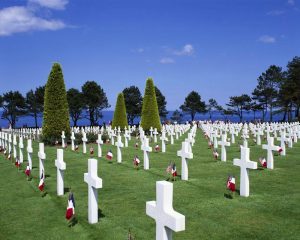
Originally the last Monday in May was set aside to remember those that lost their lives while serving in our military. It was called Decoration Day and began shortly after the American Civil War as the widows and families of the war dead would go and decorate the graves of their loved ones.
Today the graves are still decorated, although its harder to find volunteers, flags flown from houses, parades, or even moments of silence. Some will fill their social media feed with reminders to remember those lost and thank a veteran. In the past, I have chosen to fill this weekend with many of these traditions as well.
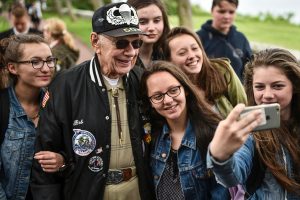 I understood Memorial Day; as a historian, I had studied its beginning. As the daughter and granddaughter of veterans, I knew how to honor those that sacrificed. I have friends that are veterans who have lost brothers in combat, so I knew how to thank them for their service. It turns out I didn’t really know how to celebrate Memorial Day.
I understood Memorial Day; as a historian, I had studied its beginning. As the daughter and granddaughter of veterans, I knew how to honor those that sacrificed. I have friends that are veterans who have lost brothers in combat, so I knew how to thank them for their service. It turns out I didn’t really know how to celebrate Memorial Day.
Six months ago, I began working with The Girl Who Wore Freedom project and, in that time, I have learned the best way of honoring the sacrifices of those served. The flags, the parades, the speeches and quiet moments are wonderful, but they don’t go far enough. The people of Normandy do all these same things, but they take their remembrances further. They demonstrate not just that they remember the sacrifice, but they cherish those that served and those that died. They express their gratitude by leaning in and listening well to the soldier’s stories and the stories of those that were lost.
You don’t have to take my word for it, watch Flo Plana interview veteran Ceo Bauer, US Army 95th Infantry Division:
The Normandy people, like Flo, do two things well. When interacting with veterans, they are already familiar with their history. Christian Taylor explained that because the French people understand the general history and details associated with when and how they served, they can move very quickly most past general topics and talk deeply and personally with the veterans. They also take the time to listen well. We live at a time in history where everything moves fast, and we all try to push as much as possible into every day. When Christian thanks her Norman friends for sacrificing their time for a veteran, they always respond, “It was no sacrifice, theirs was the sacrifice.”
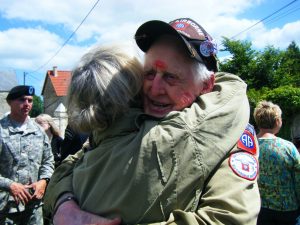 This unique gratitude demonstrated by the French has literally changed lives. Christian has heard many, many stories of soldiers worn down by time and their memories, then transformed due to the love and gratitude of the French people in Normandy. She has personally seen them walking taller, smiling wider, dancing, and telling stories late into the night just like when they were young soldiers serving far from home. This transformation is not limited to only those lucky enough to return to Normandy. While researching a future article, I was blessed to see for myself how a few video calls and letters from France transformed one veteran burdened by his service and the loss of his brother during the war. Unsurprisingly, not just the veterans are changed, but so are their families and friends that also experience this life-changing gratitude.
This unique gratitude demonstrated by the French has literally changed lives. Christian has heard many, many stories of soldiers worn down by time and their memories, then transformed due to the love and gratitude of the French people in Normandy. She has personally seen them walking taller, smiling wider, dancing, and telling stories late into the night just like when they were young soldiers serving far from home. This transformation is not limited to only those lucky enough to return to Normandy. While researching a future article, I was blessed to see for myself how a few video calls and letters from France transformed one veteran burdened by his service and the loss of his brother during the war. Unsurprisingly, not just the veterans are changed, but so are their families and friends that also experience this life-changing gratitude.
We have so many freedoms, which we often take for granted, that were secured by men and women with their lives very far from the places that we call home.
Conflict Casualties
WWII 405,399
Korea 36,574
Vietnam 58,220
Persian Gulf 383
Global War on Terror 6,951
(as of Nov 2018)
Each of these casualties has a name and a story to tell us. They have friends that fought beside them, 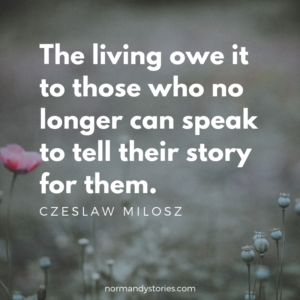 and they also have a story to tell. They have families living with their loss that has a story to tell. This Memorial Day may we encourage you to find someone with a story of service and sacrifice to share and then slow down, lean in and listen well. Change a life with your gratitude.
and they also have a story to tell. They have families living with their loss that has a story to tell. This Memorial Day may we encourage you to find someone with a story of service and sacrifice to share and then slow down, lean in and listen well. Change a life with your gratitude.
Originally, this post came from the lessons I had learned from Ceo Bauer and others about how to truly honor those that have served and sacrificed. While Memorial Day is a time to honor and remember those that we have lost through their service, this Veteran’s Day provides an opportunity for each of us to honor all veterans. Last July, I was lucky enough to meet veterans Bob Devinney and Ceo Bauer at our Chicago event and spend a morning listening to their stories. May each of you be as lucky and have an opportunity to sit with a veteran, listen to their stories and change their life and yours.
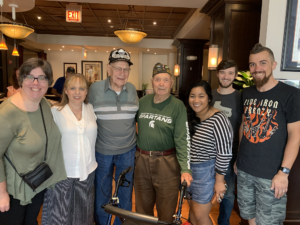


Recent Comments